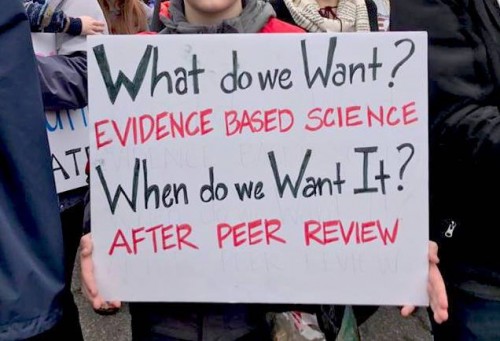Monday 24 April 2017
The marches for science in many cities around the world this weekend were good to see. We often seem to be entering a world of anti-science, especially amongst the religious right in the US and the current administration. Groups like the anti-vaccination brigade and those who want to teach creation alongside evolution are bad signs of the growing power of anti-science. At the same time we are increasingly dependent on technology, much of which flows from a deep scientific understanding of the universe and how it works, at least in the little backwater that we inhabit. It is weird that the anti-science people still want benefits from science including clean water, cheaper and healthier food, medical treatment (apart from the ones they disagree with), electricity, the internet and mobile phones.
The great physicist Richard Feynman wrote an essay called “The Value of Science”. He talks about three values. Firstly the obvious one is the technology that flows from science. Technology is not always driven by science but the two things are increasingly inter-dependent. Science has allowed us to develop medicines that have eliminated diseases like polio and smallpox, it helped developed anaesthesia, it enables us to understand and harness electricity, it allowed us to develop micro-processors etc. etc. The list goes on and on. Feynman’s second value is the inspiration and enjoyment that comes from exploring the universe. Even if we personally cannot directly take part or fully comprehend much of the science it is inspiring to read and think about. Who cannot be at least a little inspired by scientists being able to decode DNA, or listening to the sound of radio signals received from pulsars by Jodrell Bank, or this picture of earth taken by the Cassini probe around Saturn? (The arrow mark earth).
The third value that Feynman identified is that science always deals with ignorance, doubt and uncertainty. He said:
“Now, we scientists… take it for granted that it is perfectly consistent to be unsure, that it is possible to live and not know. But I don’t know whether everyone realizes this is true. Our freedom to doubt was born out of a struggle against authority in the early days of science. It was a very deep and strong struggle: permitting us to question – to doubt – to not be sure. I think that it is important that we do not forget this struggle and thus perhaps lose what we have gained. Herein lies a responsibility to society.”
This is subtle but important. It is about our freedom to doubt authority. Scientists like Galileo challenged authority and science continues to do that to this day. The element of doubt Feynman refers to is so vital because the really dangerous people in the world are the anti-science people with no doubts.
Science is amazing. It is also part of what makes us human. Only a science based approach can make everyone wealthy and healthy and clean up the environment, which is what we need to do as quickly as possible. We should be massively increasing spending on science and science education not cutting it.
Sign of the day.
Comments
There is 1 comment on “The Long March for Science”:
Dr Steven Fawkes
Welcome to my blog on energy efficiency and energy efficiency financing. The first question people ask is why my blog is called 'only eleven percent' - the answer is here. I look forward to engaging with you!
Tag cloud
Black & Veatch Building technologies Caludie Haignere China Climate co-benefits David Cameron E.On EDF EDF Pulse awards Emissions Energy Energy Bill Energy Efficiency Energy Efficiency Mission energy security Environment Europe FERC Finance Fusion Government Henri Proglio innovation Innovation Gateway investment in energy Investor Confidence Project Investors Jevons paradox M&V Management net zero new technology NorthWestern Energy Stakeholders Nuclear Prime Minister RBS renewables Research survey Technology uk energy policy US USA Wind farmsMy latest entries
- Ethical AI: or ‘Open the Pod Bay Doors HAL’
- ‘This is not the end. It is not even the beginning of the end. But it is, perhaps, the end of the beginning’
- You ain’t seen nothing yet
- Are energy engineers fighting the last war?
- Book review: ‘Stellar’ by James Arbib and Tony Seba
- Oh no – not the barriers again
- Don’t assume ignorance, sloth, bias or stupidity





I hope I’m proved wrong, but at the current rate of “distrust in science”, I think it’s more likely that we’ll head towards a mid-century meltdown. Interesting article on that front:
http://www.bbc.com/future/story/20170418-how-western-civilisation-could-collapse